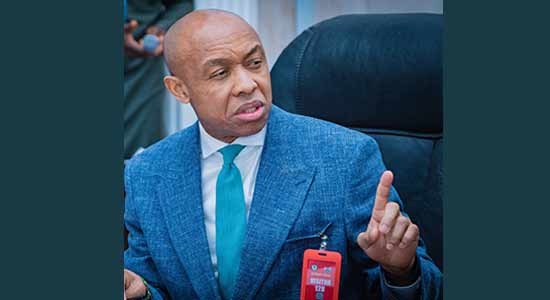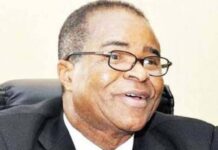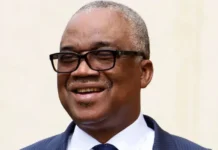In this interview with Ise-Oluwa Ige, former Chairman of the National Human Rights Commission (NHRC) and university don, Prof Chidi Odinkalu spoke extensively on a wide range of legal issues including increasing cases of conflicting judgments emanating from all levels of court in the country, quest for the ‘unbundling’ of the S’Court and the need to unbundle the Office of the Chief Justice of Nigeria, salary of judges, election litigations and the quality and authority of the judiciary under Justice Olukayode Ariwoola with prescriptions on what Justice Kudirat Kekere-Ekun should do to reform the nation’s Supreme Court and the entire judiciary from August 2024.
The tenure of the incumbent CJN, Justice Olukayode Ariwoola, is about expiring. How do you assess his administration?
Thank you, Ise, for having me. How are you doing? Welcome to 2023. It is customary to wish ourselves a happy New Year. I would like to wish you the same even if few Nigerians remember the last time a new year was better than the one that preceded it. 2023 was a very difficult year for Nigerians on many fronts. The judiciary is one reason why it was so. Yes, it is indeed true that the incumbent Chief Justice of Nigeria, Olukayode Ariwoola, will attain the mandatory retirement age of 70 on 22 August 2023. There will be time then to examine his legacy properly. I don’t want to get ahead of the calendar on that. Some things are fairly clear at this point though: this CJN has massively corroded the quality and authority of the judiciary. His tenure has, in my view, been a boon to the project of judicial capture and it seems quite clear that he has enabled it in order to benefit himself and his close coterie. For evidence, you only need to look at the appointments and preferment that have happened under him, including the appointment of his son as a judge of the Federal High Court; the preferment of the son-in-law of the President of the Court of Appeal and the CJN’s nephew to the Court of Appeal bench and some of the judicial insider-deals that took place under his watch, which will be much easier to get into when he is out of office. There will be time to connect the dots on his tenure and I am not sure the picture that emerges will be too pretty nor is it immediately evident to me that he can do anything in the eight months that he has got left to change that. I presume that he will spend much of the remainder of his term prioritising the construction of his retirement facility in Ikoyi. I wish him well.
Justice Kudirat Kekere Ekun is the Deputy CJN. By virtue of the tradition of seniority on the bench, she is the next CJN. By way of setting agenda for Justice Ariwoola’s successor, what would you expect from her administration?
Strictly speaking, there is nothing like a deputy CJN. In practice, yes, the next senior-most Justice after the CJN deputises for him or her in the constitutional role on the NJC, in particular and in running the Supreme Court if the CJN is indisposed or absent and, the senior-most Justice at the retirement of a CJN has succeeded to the office since Sodeinde Sowemimo succeeded Fatayi Williams in 1983. So, this convention suggests that Justice Kekere Ekun will become CJN at some point in this new year. Everyone, including the incumbent CJN, knows that the judiciary in Nigeria at the moment suffers from an awful credibility and trust deficit. He said as much when he inaugurated the new SANs at the end of November last year. Of all the branches of the government, none suffers as much from this kind of deficit as the judiciary. It is the only un-elected branch. The people can theoretically turn over politicians in the executive or legislative branches with whom they are dis-satisfied, if the electoral process works. In Nigeria, many judges are unquestionably in cahoots with politicians to make sure that is frustrated. So, we are now in the crazy situation in which judges have the final votes in elections; political cases now dominate the judicial dockets; and the regular cases hardly get heard because the judges prefer to prioritise political cases in which the politicians will be chasing them around with blandishments and inducements. The other day, the Chief Judge of the FCT left his office to go and genuflect for the Minister of the FCT in the office of the Minister. It was degrading beyond measure. But that is what the judiciary has allowed itself to be reduced to. The new CJN will have to address the challenge of reforming judicial appointments for greater transparency and accountability so that credible people can have a pathway to judicial service. Above all, she will have to confront the issue of un-bundling that office of the CJN because it has become the biggest obstacle to restoring credibility to the judiciary. Justice Muhammad Dattijo made that point eloquently on his retirement. So, the new Chief Justice has a massive load of reconstruction to undertake. I don’t envy her. The good thing is she will have about four years in the office which is more than any of her recent predecessors since Justice Uwais. That should be long enough to leave a constructive legacy.
One of the challenges plaguing the judiciary today is the increasing number of conflicting judgments emanating from our courts on similar legal issues. What is your advice?
Why would I have advice for judges on conflicting judgments? Like seriously? When you read most of these so-called conflicting judgments, you see that what is called conflict is wilful on the face of the record most of the time. It is not as if the judges don’t know what they are doing. The reasons for the conflicts in a good many cases are self-evidently extra-judicial. So, I really am not sure it is my place to advise people who are sworn to be judges as to how to ensure that their decisions are rational and sensible. You even see the highest courts in the land telling themselves that particular decisions are to be confined and not to be treated as precedents. Yet we are in a system governed by the doctrine of judicial precedent. When judges, for extra-judicial reasons, create manifestly avoidable conflicts in decisions or precedents, they don’t need advice. They need to be held accountable.
Do you subscribe to the idea of unbundling the S’Court by way of setting up the apex court for each geo-political zone in the country?
I am not sure what the idea of “unbundling the Supreme Court” means. It sounds different from the idea of unbundling the office of the Chief Justice, which I referred to earlier. Let me explain the latter idea. The CJN is a complex of constitutional and statutory roles in one person at the same time. S/he is the head of the Supreme Court; the head of the judiciary; the Chairperson of the National Judicial Council in executive capacity; and chairperson of the Federal Judicial Service Commission (FJSC, which oversees appointments to all federal courts, including the Supreme Court, Court of Appeal, Federal High Court, the courts of the FCT, among others). The CJN also chairs the board of the National Judicial Institute (NJI), and chairs the Legal Practitioners Privileges Committee (LPPC), in addition to being a member of the National Council of State for life. Many of these roles are not mutually aligned. As the chair of the FJSC, for instance, the CJN gets two bites at the cherry of judicial appointments. So, if you have an appointment to the Supreme Court or Court of Appeal, the CJN will preside over the FJSC to first consider nominations for recommendation to the NJC; then s/he will preside again over the NJC to decide on those recommendations. That just seems incomprehensible. The easiest thing to do is to confine the office of CJN to the FJSC and then have a retired senior figure of some weight or authority chair the NJC. You need some dynamic tension in those two roles. Merging them in one person is conducive to judicial capture. Essentially, the idea of un-bundling the office of the CJN is to split up the roles of judicial appointments and judicial discipline to ensure one person does not head both streams. If I may ask you: can you trust the Chief Justice who presided over the appointment of his own son to the judiciary to be able to discipline the same son if there is a serious complaint against him as a judge?
Turning to the question about unbundling the Supreme Court, I confess that I have read about this idea of setting up a Supreme Court for each geo-political zone of Nigeria in a few places. Assuming you want me to be honest, I will simply say that the idea is silly. I could give you several reasons. First, if you have different courts of co-ordinate jurisdiction as is inherent in this idea, then it can no longer be referred to as “Supreme”. Second, the idea of creating Supreme Courts at the level of the six geo-political zones simply defaults to a classic Nigerian preoccupation with nativisation or Bantustanization of everything. It is a confession of elite inability or unwillingness to build a country that can work for all who live in it. Third, that idea subverts the promise of equality before the law. So, it will be our way of saying that the quality or colour of justice you can get in Nigeria is dependent on your location, ethnicity or post-code around the country and also that the only way to get justice is if your kinsfolk are the people sitting on the case. I bet you, after that, the next thing will be to devolve those courts to the level of the states and then to ethnic nativities. If I may add, you will then be writing the idea of conflicting judgments into the design of the court at that level. I have never heard a more risible idea to be honest with you. It is also a lazy approach to the evident fact that the present situation of making the Supreme Court an all-comers affair where appeals get filed in order to kill off any idea of justice is unworkable.
So, clearly, the Supreme Court needs to be reformed. A docket of over 10,000 cases most of which will not be heard even by the next three generations of Supreme Court Justices, is not on. Even if you were to double the current rate of disposal of cases, the current docket of the Supreme Court will still take over 25years to clear up and that is without filing any more cases. That is unworkable. But surely it is rather easy to see a pathway to reforming the Supreme Court without going the way of this idea of nativising or Bantustanising it into extinction.
Salaries of judges at all levels are nothing to write home about. National Industrial Court gave an order recently for upward review but nothing has been done. How do you react to this?
You are kidding me, right? Look, the Chief Justice just made his son a judge; the President of the Court of Appeal made her daughter a judge in 2021 in Plateau State and her son-in-law a Justice of the Court of Appeal in 2023; the Chief Judge of Ogun State got her nephew appointed a judge in 2023; the wife of the president of the National Industrial Court was made a judge not too long ago; the daughter of the immediate past President of the Court of Appeal was made a judge at the same time; as were two daughters of a recently retired Justice of the Supreme Court; as was the wife of a Justice of the Supreme Court who died recently; as was…. Look, I could go on. So, let me ask you: you think all these people are putting their children and consorts in these positions because they hate their children and wives and want those children and consorts or spouses to suffer in these positions that give them hardship pay? Please, people should spare us this nonsense! If judicial positions are such hardship posts, why are those occupying those positions so keen to fill them up with their children, wives and mistresses? There are only two logical explanations: it is either there are pay-offs we don’t know or the position is corrupt. So, first, let us be clear what it is before we get further on this issue, please. There is clearly something that does not add up.
Going by what we have seen lately, should election litigations end before governors and president are sworn-in, in future?
The simple answer to that is yes. The Uwais Electoral Reform Panel made precisely that recommendation in its final report in 2008. The politicians committed to election rigging did not see self-interest in enacting it. PDP was in power then. They believed they will be in power forever. If they had enacted it then, they would have secured themselves a better chance in opposition of returning to power by guaranteeing that the INEC would do a better job than it has let itself into under the current leadership. So, unquestionably yes. There is a way to do it: let the burden rest on INEC to prove substantial compliance before a court constituted to certify the credibility of the elections before the result is announced. So, the procedure can actually be fairly brisk. As a matter of design, it could be more inquisitorial than adversarial.
Source: Vanguard




